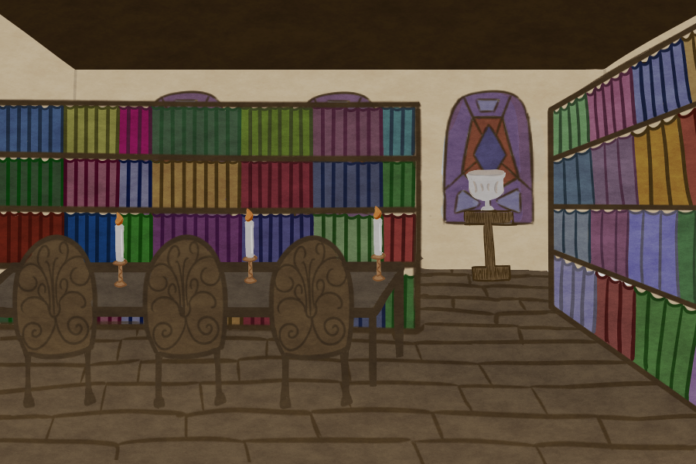Unfolding the origins of the literary subgenre and aesthetic
By CORALIE LOON — arts@theaggie.org
With spring just around the corner, lovers of the darkest and coldest time of the year are savoring the last moments of winter. One way to make use of the last few weeks of the rainy season is to stay inside, curl up with a warm drink and get lost in a good book.
Dark Academia, a literary subgenre and aesthetic that has gained considerable popularity in the last decade, may be perfect for lovers of mystery, historical fiction, academic settings and sometimes even fantasy. According to L’Officiel, while the term Dark Academia “first appeared on the blogging platform Tumblr around 2015,” the genre is widely accepted to have been sparked by Donna Tartt’s 1992 novel, “The Secret History.”
Book Riot defines Dark Academia as “a book which features an academic setting, like a college or boarding school, and usually features some kind of a dark twist.” L’Officiel cites common elements of Dark Academia as classical literature, European art, gothic architecture and the appearance of “puzzles, murder, danger, cults and secret clubs.” This element of darkness, which distinguishes it from “light” and much more romanticized academia, often serves as a commentary on the “darkness” of elitist culture.
For those who grew up reading “Harry Potter,” Dark Academia has a certain appeal as the grown-up version of the magical, anachronistic high-school drama. If any of these elements sound intriguing, here are some of the best Dark Academia books to read this year:
“The Secret History” by Donna Tartt (1992)
It’s hard to find any list of Dark Academia books without “The Secret History” on it. This modern classic is an immersive, slow and simmering story of murder within a group of college students. The story is narrated by Richard Papen, who, after beginning to attend college in New England, attempts to join an exclusive ancient Greek program that is as small and intriguing as it is elusive. Naturally, things don’t go as planned. What makes this book interesting is not the murder itself, but the coy way the narrative structure frames the murder and slowly uncovers all that happens leading up to and following the pivotal moment.
There’s a reason this book is often called the original Dark Academia novel: its atmospheric and immersive tone, the presence of a mysterious “society” and its literature-loving and elitist cast of characters all cumulate into this memorable plunge into corruption and moral ambiguity.
“Vita Nostra” by Maryna and Serhiy Dyachenko (2007)
Originally written in Russian and translated by Julia Meitov Hersey, this novel combines references to Dark Academia with heavy doses of fantasy and existential dread. “Vita Nostra” follows a young woman, Sasha, who encounters a mysterious man while vacationing by the beach. Sasha is manipulated into following the stranger’s requests, which are increasingly bizarre and revealed to be part of an initiation into a school she’s never heard of: The Institute of Special Technologies. The story follows her journey through an education that seems to baffle as much as it teaches.
“Vita Nostra” is not for the casual reader: it is dark, ambiguous and detached from the physical world. A Goodreads user by the name of “Rincey” compared the book to “Harry Potter,” if it was written by Kafka. A better definition would be hard to come by.
“If We Were Villains” by M.L. Rio (2017)
Another classic on the Dark Academia bookshelf, “If We Were Villains” is the most similar to “The Secret History” out of the books on this list. It follows Oliver, a man who was imprisoned for supposedly murdering a fellow classmate in his college days, as he explains the truth of the event to a detective. Similar to “The Secret History,” “If We Were Villains” follows a group of friends brought together by a similar interest: in this case, Shakespeare. As the story progresses, interpersonal relationships grow and tensions bubble, slowly blurring the lines between theatrics and reality.
“If We Were Villains” is captivating, dramatic and hard to put down, making it a more favorable read for those who found “The Secret History” to be too meandering. Despite its commitment to almost all the tropes of Dark Academia literature, it reads as a fresh and memorable take on a Shakespearean tragedy.
“Maurice” by E.M. Forster (1971)
Not published until a year after the author’s death, “Maurice” is not usually viewed as a member of the Dark Academia subgenre. However, its setting at a university, focus on interpersonal relationships and involvement with literature, art and Greek culture make it a prototype of the genre’s eventual development. “Maurice” follows the life of a young man growing up and grappling with his sexual identity. While studying at Cambridge University, he begins to fall in love with his classmate, Clive, and develops a relationship that is strained by both parties’ inability to commit to something they find morally unjustifiable.
“Maurice” lacks the elements that make it clearly “dark” — no murder occurs and nothing supernatural pokes through the surface. But it is also not clearly “light” academia — it critiques elitist culture and the heteronormative world it produces rather than romanticizing them. At the heart of “Maurice” is the theme that appears again and again in Dark Academia: characters who are rejected by the outside world and must create their own version of social reality.
Written by: Coralie Loon — arts@theaggie.org




